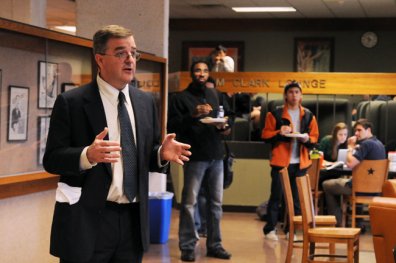Editor’s Note: This is part of a series of Q-and-A’s with the deans of the University’s 18 schools and colleges. Ward Farnsworth was appointed dean of the law school in 2012.
The Daily Texan: What would you say are the major initiatives that you’ve undertaken since you came to the University?
Ward Farnsworth: My biggest concern about legal education is that it’s gotten a lot more expensive, and the expected value of the degree has not kept pace with the rising expense. For many years, the UT law school was the most remarkable deal in American legal education. It was almost free, and it provided a top tier credential and top tier opportunities. A lot of that is still true, but I can no longer claim that we’re almost free. Our tuition’s gone up a lot, as it has at most law schools. Our tuition is still, for in-state residents, $15,000 a year less than at any other school in the top 15 … But if we are going to try to recreate the really great conditions of being a student here that this place traditionally has been associated with, it’s going to have to be through alumni support.
DT: Could you say more about reaching out to alumni for donations?
Farnsworth: Most of our alumni think this was an extraordinary decision they made to come to UT Law School. What they don’t all think and know is that we need their support. If you go to a law school almost for free, it probably doesn’t occur to you that the law school needs a lot of support from alumni, and at one time, we didn’t. When we were supported mostly by the state, alumni contributions were helpful, but we didn’t need everybody to be on board and everybody to be in. That’s changed, and a lot of our alumni, once they understand that’s changed, are very happy to get more involved with financial support … I spend a lot of time studying what’s going on in other schools, and most of them have models in which their alumni support the school in larger percentages than ours have. So part of my drive has been not to seek huge gifts, although every dean likes a huge gift, but also just to get more of our alumni participating at all and giving back to the school.
DT: I’m just curious what your response is to all the charges that have come out about how legislators are helping students who apply get into the law school when they might not deserve it based on their LSAT scores or their bar passage rates.
Farnsworth: I occasionally get letters or calls from legislators who want to put a good word in for a constituent. I’ve never thought there was anything untoward about it. Sometimes the applicant gets in, and sometimes not. It depends on the whole file. I’m fine with telling legislators that we aren’t going to be able to admit candidates they support. I’ve done that, and have found them good-natured about it.
DT: What areas of law do students at the UT Law School want to go into? What are the most popular areas?
Farnsworth: A lot of them are attracted to the energy area … Intellectual property is an area that a lot of students are interested in. We have a lot of students who want to do public interest work … A majority of our students spend some time just helping out an underserved population with their legal needs. For the students who do that, they usually say it’s one of the great things they did in law school, and it whets their appetite for more of the same when they get out … It’s my general feeling that if you go to the flagship public law school in the state of Texas, when you get out, you ought to be able to afford to work for the state of Texas, and we’re doing everything we can to enable that.
















